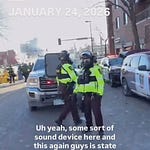Andrew Jackson once defied the Supreme Court. Donald Trump idolizes him — and now, his administration is doing the same. From a workplace raid in Lakewood to ICE agents taunting José Castro in Fontana, federal court orders mean little when the White House refuses to obey.
By Nick Valencia | August 5, 2025
ATLANTA— History remembers Andrew Jackson for many things, not least the apocryphal line he’s said to have uttered in defiance of the Supreme Court: “The court has made its decision; now let them enforce it.”
The story goes like this: in 1832, the Court ruled that Georgia had no legal authority over the Cherokee Nation. Jackson, president at the time, supposedly shrugged and made clear he had no intention of complying. Historians say he never actually spoke those exact words, but the sentiment was real enough. Jackson believed the courts had no real power to force the executive branch to obey.
President Donald Trump has long admired Jackson, even hanging the former president’s portrait in the Oval Office. It’s fitting, then, that his administration now mirrors Jackson’s defiance toward the courts.
Over the weekend in Lakewood, California, immigration rights advocates and attorneys believe federal agents violated a temporary restraining order that bars immigration enforcement from detaining people based solely on their skin color or presumed immigration status. The order also prohibits agents from staking out workplaces they believe to employ undocumented labor. And yet that’s exactly what appeared to happen.
Witnesses say immigration agents conducted a workplace raid, detaining several people. The exact number is still unclear—advocates estimate perhaps as many as 10. If true, it’s a textbook violation of a federal judge’s order. And it’s not an isolated incident.
In Fontana, a man named José Castro found himself being trailed by ICE agents on his way home from work. When he realized they were following him, he texted his wife to open the door. He made it inside moments before the agents reached his apartment. Ring camera footage shows them lingering outside, taunting him to come out, shaking his keys on camera—without, by their own admission, a warrant.
For days after—according to advocates—they loitered near his apartment complex. They had his car towed, claiming it rolled into another vehicle after he abandoned it. Video evidence and Castro’s account suggest otherwise.
“They clearly didn’t have a warrant,” says Tamara Marquez, communications director for the Inland Coalition for Immigrant Justice. “This was racial profiling, pure and simple. If they can do it to him, they can do it to anyone.”
ICE later issued a statement claiming Castro had a criminal record and posed a danger to the public. But according to Castro and documents reviewed by advocates, the only brush he’s had with the law came years earlier—when a neighbor threatened him and his family with a gun. Castro called the police, but due to a language barrier, the incident was twisted against him.
And yet the Trump administration, much like the president in that old Andrew Jackson tale, seems to be signaling: We’ll do what we want. Let the courts try to stop us.
The temporary restraining order barring racial profiling by ICE isn’t a suggestion—it’s binding. But as these cases show, it’s being treated as little more than an inconvenience. In this America, the message from the top seems clear: The courts have made their decision. Now let them enforce it.











